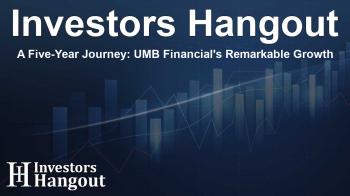A Five-Year Journey: UMB Financial's Remarkable Growth

Understanding UMB Financial's Growth
Over the last five years, UMB Financial (NASDAQ: UMBF) has shown impressive performance, significantly outpacing the broader market. With an annualized gain of 6.17%, UMB Financial has returned an average of 21.15% year-on-year. This consistent growth has raised its market capitalization to approximately $9.30 billion, highlighting its stature in the financial sector.
Investing in UMB Financial
Imagine having invested $100 in UMB Financial five years ago. That modest investment would have appreciated to an astonishing $259.40 today, based on a share price of $122.54 reported recently. Such growth exemplifies the power of strategic investing, particularly in a company that demonstrates resilience and strong financial practices.
The Power of Compounding Returns
The journey of that initial $100 investment offers a vital lesson in investment strategy—the impact of compounded returns. The growth of investments over time can result in substantial increases, showcasing the importance of patience and decision-making in the financial world.
Market Performance Snapshot
As you look deeper into UMB Financial's performance, the trends paint an encouraging picture for potential investors. With robust revenue growth and a solid balance sheet, UMBF has positioned itself well to navigate through varied market conditions. The company’s ability to generate consistent returns is a testament to its strategic management and operational efficacy.
Investing for the Future
Prospective investors considering UMB Financial should appreciate not only its past performance but also its future potential. A well-executed investment strategy can capitalize on the company’s inherent strengths, providing investors with opportunities to gain further returns in the ever-evolving financial landscape.
Conclusion
Understanding the factors that contribute to UMB Financial’s success can offer insights for anyone interested in making informative investment choices. With a growth trajectory like this, one can see that informed and strategic investing will always play a crucial role in long-term financial success.
Frequently Asked Questions
What is UMB Financial's stock ticker?
UMB Financial trades under the ticker symbol UMBF on the NASDAQ.
How much would a $100 investment in UMB Financial be today?
A $100 investment in UMB Financial five years ago would be worth approximately $259.40 today.
What is the market capitalization of UMB Financial?
UMB Financial has a market capitalization of around $9.30 billion.
What were UMB Financial’s average returns over the past five years?
UMB Financial has produced an average annual return of 21.15% over the last five years.
Why is it important to consider compounded returns?
Compounded returns significantly enhance the growth potential of investments over time, illustrating the benefits of patience and long-term strategy in investing.
About The Author
Contact Thomas Cooper privately here. Or send an email with ATTN: Thomas Cooper as the subject to contact@investorshangout.com.
About Investors Hangout
Investors Hangout is a leading online stock forum for financial discussion and learning, offering a wide range of free tools and resources. It draws in traders of all levels, who exchange market knowledge, investigate trading tactics, and keep an eye on industry developments in real time. Featuring financial articles, stock message boards, quotes, charts, company profiles, and live news updates. Through cooperative learning and a wealth of informational resources, it helps users from novices creating their first portfolios to experts honing their techniques. Join Investors Hangout today: https://investorshangout.com/
The content of this article is based on factual, publicly available information and does not represent legal, financial, or investment advice. Investors Hangout does not offer financial advice, and the author is not a licensed financial advisor. Consult a qualified advisor before making any financial or investment decisions based on this article. This article should not be considered advice to purchase, sell, or hold any securities or other investments. If any of the material provided here is inaccurate, please contact us for corrections.

